|
|
|
Sort Order |
|
|
|
Items / Page
|
|
|
|
|
|
|
| Srl | Item |
| 1 |
ID:
130244
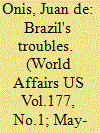

|
|
|
|
|
| Publication |
2014.
|
| Summary/Abstract |
With the extravaganza of the winter Olympic Games in Sochi over, the spotlight now turns to Brazil, the host of the FIFA World Cup championship in June. This tournament, the most widely viewed of global sports spectacles, is held every four years and involves thirty-two national teams, each of which has survived two years of regional competitions in Europe, Africa, Asia, and the Americas to reach the final play-offs. Starting on June 12th, sixty-four games will be played in four weeks, in stadiums all over Brazil, until the winner emerges in a final match on July 13th at the Maracanã, Rio de Janeiro's world-famous arena. Three million foreign fans are expected to visit Brazil, and billions of television viewers worldwide will watch the games. When the World Cup was awarded to Brazil in 2007-part of a remarkable parlay that included the award of the 2016 Summer Olympics to Rio as well-the country's economy was starting to boom as part of the BRIC upsurge that seemed ready to shake up international finance. The event was political from the onset, its significance potentially going well beyond the results on the playing fields where Brazil has won the world championship a record five times, a source of great national pride. But despite initial euphoria over being chosen to host the World Cup, Brazil is now experiencing doubts over whether it can pull off the event and second thoughts about the upsurge of influence on the international scene it was supposed to symbolize. The fervid devotion of Brazilians to soccer has made this country the Land of Football (as well as samba and Carnaval). Some non-Brazilian sports commentators have been baffled, therefore, by protest signs saying, "No to the Cup." But Brazil today is not just a land of football, it is also a land of public protests against corruption, heavy taxes, and deplorable public education and health services, cities with chaotic urban transport, markets with inflated consumer prices, and a dysfunctional political system that is manipulated by an elite for personal benefit.
|
|
|
|
|
|
|
|
|
|
|
|
|
|
|
|
| 2 |
ID:
131060
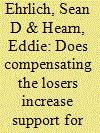

|
|
|
|
|
| Publication |
2014.
|
| Summary/Abstract |
The political economy of trade literature argues that compensating those who lose from trade is an important component of maintaining public support for free trade, a linkage known as the compensation hypothesis or embedded liberalism thesis. Previous research has found support for many elements of the causal chain underlying embedded liberalism; however, there has been little research on the most crucial element of the causal chain, namely that compensation policies lead to increased support for trade. This article provides a direct test of the compensation hypothesis using a survey-based experiment conducted in the United States that exposes half of the respondents to knowledge of compensation programs and then asks for their opinion on trade policy. The article explores whether knowledge of compensation increases support for trade as well as who is influenced by this knowledge and, thus, provides a crucial test of the embedded liberalism thesis.
|
|
|
|
|
|
|
|
|
|
|
|
|
|
|
|
| 3 |
ID:
137174
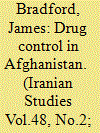

|
|
|
|
|
| Summary/Abstract |
This article explores the process leading to the Afghan government's decision to implement a prohibition and eradication of opium in the northeastern province of Badakhshan. It explores why Daud chose Badakhshan, the impact of the opium ban on the people of Badakhshan and the future of opium production and trade, as well as the evolution of drug control in Afghanistan under the Musahiban dynasty. Ultimately, the ban was launched because it allowed Daud to garner international praise and financial support, while enforcing eradication in an area inhabited by ethnic minorities ensured that the Afghan government's coercive strategy would not generate resistance from rural Pashtun tribes historically opposed to these types of state intervention.
|
|
|
|
|
|
|
|
|
|
|
|
|
|
|
|
| 4 |
ID:
088182
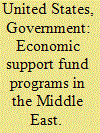

|
|
|
|
|
| Publication |
Washington D C, United States Government, 1979.
|
| Description |
79p.
|
|
|
|
|
|
|
|
|
|
|
|
Copies: C:1/I:0,R:1,Q:0
Circulation
| Accession# | Call# | Current Location | Status | Policy | Location |
| 019064 | 338.910956/UNI 019064 | Main | On Shelf | Reference books | |
|
|
|
|
| 5 |
ID:
132671


|
|
|
|
|
| Publication |
2014.
|
| Summary/Abstract |
In the objective of reaching the "nearly zero-energy buildings" target set by the European Union, municipalities cover a crucial role in advocating and implementing energy-efficient measures on a local scale. Based on a dataset of 322 municipalities in Northern Italy, we carried out a statistical analysis to investigate which factors influence the adoption of energy efficiency in municipal buildings. In particular, the analysis focuses on four categories of factors: (i) capacity building for energy efficiency, (ii) existing structure and competences for energy efficiency, (iii) technical and economic support for energy efficiency, and (iv) spill-over effect caused by adoption of "easier" energy-efficient measures. Our results show that capacity building through training courses and technical support provided by energy audits affect positively the adoption of energy efficiency in municipal buildings. The size of the municipal authority, the setting of local energy policies for residential buildings and funding for energy audits are not correlated with energy efficiency in public buildings, where the "plucking of low hanging fruit" often prevails over more cost-effective but long-term strategies. Finally, our results call for the need to promote an efficient knowledge management and a revision of the Stability and Growth Pact.
|
|
|
|
|
|
|
|
|
|
|
|
|
|
|
|
| 6 |
ID:
133713
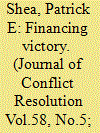

|
|
|
|
|
| Publication |
2014.
|
| Summary/Abstract |
With access to inexpensive credit, states can finance wars without overburdening their constituents, and face relatively small short-term costs compared to states with poor credit access. As a result of these economic benefits, states with lower credit costs will be more likely to win their wars, ceteris paribus. However, lower borrowing costs provide states domestic political benefits, which I argue are more important for democracies than nondemocracies. Since expensive credit forces states to rely on its citizens for revenue, governments that are more sensitive to their citizens' preferences are at a disadvantage. In sum, I argue that democracies are more sensitive to credit costs than authoritarian regimes. To test this theory, this article analyzes a data set of wars using logistic regressions and matching techniques, and examines the case of the Chaco War. The results demonstrate that the costs of borrowing have a substantial effect on war outcomes, and that these costs are more important for democracies than nondemocracies.
|
|
|
|
|
|
|
|
|
|
|
|
|
|
|
|
| 7 |
ID:
125309
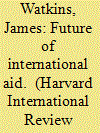

|
|
|
|
|
| Publication |
2013.
|
| Summary/Abstract |
By 2015, we will have nearly eradicated extreme poverty and hanger throughout the world by halving the proportion of people living on under $1.25 per day. We will have achieved universal primary education worldwide, reduced child mortality rates by two thirds, and halted and reversed the spread of HIV/AIDS, malaria and other diseases. We will have promoted gender equality, improved maternal health, and ensured environmental sustainability. Or at least, this is the promise that we made to ourselves, and to each other, almost 15 years ago.
|
|
|
|
|
|
|
|
|
|
|
|
|
|
|
|
| 8 |
ID:
132547
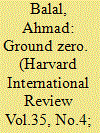

|
|
|
|
|
| Publication |
2014.
|
| Summary/Abstract |
The signing of the proposed bilateral security agreement between the US led coalition and the Afghan government is nowhere near sight, even though the declared deadline for the complete withdrawal of coalition-led forces by the end of 2014 is drawing closer everyday. This has led to a feeling of growing pessimism amongst the general public as well as those at the helm of public affairs; there is ample historic evidence to support this phenomenon. It took barely a few years for the South Vietnamese regime to fall into the hands of the North Vietnamese after the departure of US troops and drawing up on financial support, the fall of Dr. Najibullah's pro- Soviet Kabul regime to the Taliban was no different a story. While the Soviet invasion of Afghanistan was successfully thwarted when Soviet troops withdrew a decade later by an alliance whose three main partners were Saudi Arabia, Pakistan and the United States, it was the latter's unceremonious and almost sudden withdrawal from this theatre of war, which sent this region into a socio-political mayhem, which continues to date with no immediate end in sight.
|
|
|
|
|
|
|
|
|
|
|
|
|
|
|
|
| 9 |
ID:
132558
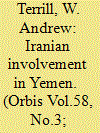

|
|
|
|
|
| Publication |
2014.
|
| Summary/Abstract |
For at least a decade, there have been numerous Yemeni, Saudi, and other countries' assertions that Iran has been involved in supporting northern Yemeni rebels seeking autonomy from the Sana'a government. Iranian diplomatic and political support for this rebellious group (known as the Houthis) is undeniable, but Iranian military assistance for them has not always been easy to prove. This situation appeared to change in 2011 when Iran's increased involvement in Yemen occurred in response to both the chaotic situation there during the final year of the Saleh regime and the danger that the Arab Spring revolutions would leave Iran increasingly isolated. Evidence of Iranian efforts to supply weapons to the Houthis now seems overwhelming in contrast to uncertain reports prior to 2011. In addition, at least some of Yemen's southern secessionists also appear to be receiving at least limited Iranian financial support.
|
|
|
|
|
|
|
|
|
|
|
|
|
|
|
|
| 10 |
ID:
133469
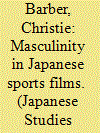

|
|
|
|
|
| Publication |
2014.
|
| Summary/Abstract |
This paper considers three recent Japanese sports films for young people, Feel the Wind (2009), Oppai Volleyball (2009) and Dive!! (2008), which employ a common sports film script to explore the ways in which masculinity is constructed, expressed and evaluated through participation in sport. Through depictions of masculinities that achieve subjective agency and acceptance by peers despite a lack of competence or victory in sport, these films disrupt the established relationship between masculinity, competence and dominance, and endorse non-normative models of masculinity. They also reflect the tensions between a desire for agency, social constraints and expectations, and the dominant ideology of masculinity. In so doing, they help to illuminate the ways in which gender is negotiated in relation to contemporary social and political conditions.
|
|
|
|
|
|
|
|
|
|
|
|
|
|
|
|
| 11 |
ID:
131949
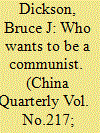

|
|
|
|
|
| Publication |
2014.
|
| Summary/Abstract |
This article analyses trends in the Chinese Communist Party's recruitment strategy and the composition of Party members. Based on original survey data, it analyses the motives for joining the CCP, the consequences on career mobility, and the effects of Party membership on political beliefs and behaviour in contemporary China. These data reveal three key findings. First, for those who aspire to positions in the Party/government bureaucracy or SOEs, Party membership is a necessary, if not sufficient, condition; for those in the non-state sector, it is youth and college education that are the keys to top jobs, and not Party membership. Second, CCP members are more likely to donate time, money, and even blood, for various causes, and to vote in local people's congress elections. This behaviour demonstrates mobilized loyalty: the CCP mobilizes its members to participate in these activities to demonstrate their loyalty to the regime and to serve as examples to the rest of the population. Third, Party members are not more likely to support and trust their state institutions: while they do have higher levels of support for the centre than the rest of population generally, Party membership does not produce increased support for the local state. Nor does economic development: all else being equal, support for central and local party-state institutions is lower in the most developed cities. These findings call into question the Party's recruitment and development policies, as well as the conventional wisdom on the link between economic development and popular support for the status quo.
|
|
|
|
|
|
|
|
|
|
|
|
|
|
|
|
|
|
|
|
|